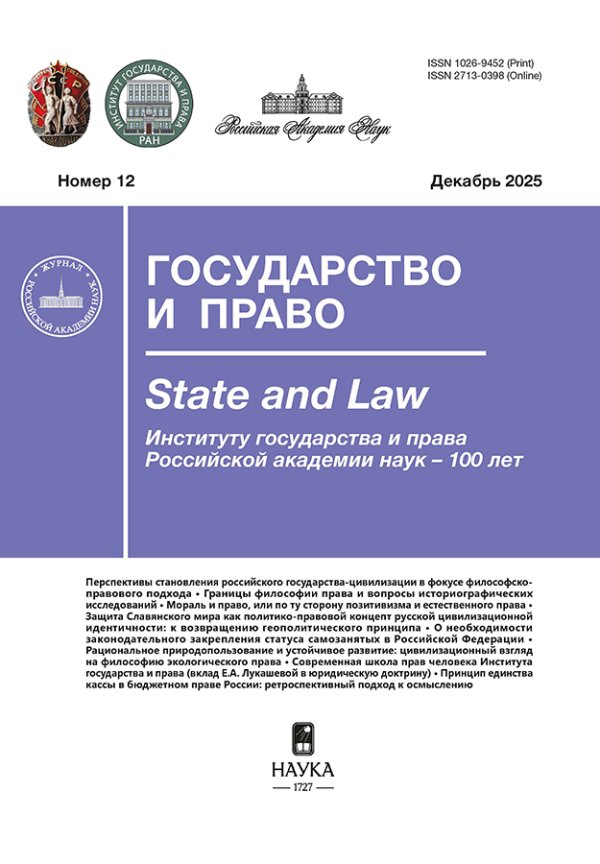Запрет на притворность: административно-правовое исследование с элементами экономического подхода
- Авторы: Коренкова С.И.1, Кириллов Д.А.1
-
Учреждения:
- Тюменский государственный университет
- Выпуск: № 5 (2023)
- Страницы: 123-130
- Раздел: Административное право и административный процесс
- URL: https://journals.rcsi.science/1026-9452/article/view/141208
- DOI: https://doi.org/10.31857/S102694520021159-5
- ID: 141208
Цитировать
Полный текст
Аннотация
В 2013 г. в Российской Федерации был введен законодательный запрет, а в 2016 г. – административная ответственность за регистрацию притворных объектов бухгалтерского учета в учетных регистрах (далее - запрет на притворность). Проведенное в 2021 году правовое сравнение понятий «притворный объект бухгалтерского учета» и «притворная сделка» продемонстрировало отсутствие интереса к запрету на притворность со стороны как юридической науки, так и правоприменительной практики. Экономисты же, проявляя с 2013 г. к изучению запрета на притворность многолетний отраслевой научный интерес, не дают оценки не только правовой обоснованности данного запрета, но и степени нарушения прав экономических субъектов. Данное обстоятельство послужило импульсом к административно-правовому исследованию запрета на притворность с учетом его экономических характеристик. В результате был сделан вывод, что данный запрет сопряжен с излишними ограничениями прав экономических субъектов, не является в полной мере юридически обоснованным и требует существенной коррекции административного и финансового законодательства.
Об авторах
Светлана Ивановна Коренкова
Тюменский государственный университет
Email: gospravo@igpran.ru
Российская Федерация, Тюмень
Дмитрий Александрович Кириллов
Тюменский государственный университет
Автор, ответственный за переписку.
Email: gospravo@igpran.ru
Российская Федерация, Тюмень
Список литературы
- Ашмарина Е.М. Учетное право (финансовый учет) как комплексное правовое образование экономического права // Вопросы экономики и права. 2012. № 9. С. 16 - 23.
- Бакулина И.П., Кириллов Д.А. О соотношении притворного объекта бухгалтерского учета в административном праве и притворной сделки // Вестник ТвГУ. Сер.: Право. 2021. № 3. С. 47– 54.
- Габов А.В. Притворные сделки в отечественном праве: история и современность // Государство и право. 2021. № 2. С. 52, 53.
- Гаджиев Н.Г., Киселева А.В., Коноваленко С.А. и др. Мнимые и притворные объекты бухгалтерского учета: предмет судебной экономической экспертизы и методика исследования // Экономика и предпринимательство. 2020. № 4 (117). С. 1243 - 1248.
- Демин А.В., Николаев А.В. Доктрина бенефициарной собственности в контексте BEPS: новые горизонты // Закон. 2018. № 8. С. 102.
- Звягинцева М.С. Вопрос-ответ // Торговля: бухгалтерский учет и налогообложение. 2014. № 1. С. 15, 16.
- Кувалдина Т.Б. Мнимые и притворые объекты бухгалтерского учета // Бухгалтерский учет. 2015. № 10. С. 91 - 94.
- Луговской Д.В., Оломская Е.В., Молодцова Ю.Н. Приоритет экономического содержания над правовой формой // Междунар. бухгалтерский учет. 2007. № 5. С. 32.
- Поляков А. Симулятивные сделки // Zakon.ru. Судебная практика. 22.06.2020. URL.: https://zakon.ru/blog/2020/06/22/simulyativnye_sdelki
- Пугачева Ю.Ф. Зачем российским банкам МСФО? // МСФО и МСА в кредитной организации. 2007. № 2.
- Соколов Я.В., Бычкова С.М. О приоритете содержания перед формой: проблемы учета // Бухгалтерский учет. 2000. № 1. С. 72.
- Сухарев А.Н. Переквалификация сделок субъектов предпринимательской
Дополнительные файлы










